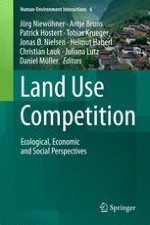2016 | OriginalPaper | Buchkapitel
19. A Water Perspective on Land Competition
verfasst von : Antje Bruns, Tobias Krueger, Bruce Lankford, Fanny Frick, Catherine Grasham, Christina Spitzbart-Glasl
Erschienen in: Land Use Competition
Aktivieren Sie unsere intelligente Suche, um passende Fachinhalte oder Patente zu finden.
Wählen Sie Textabschnitte aus um mit Künstlicher Intelligenz passenden Patente zu finden. powered by
Markieren Sie Textabschnitte, um KI-gestützt weitere passende Inhalte zu finden. powered by
